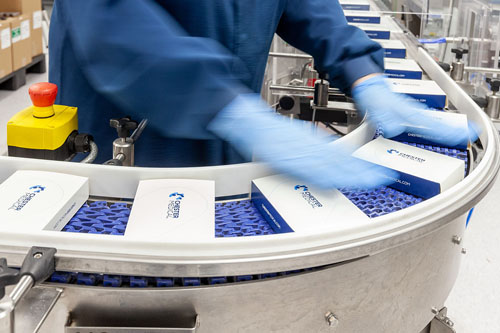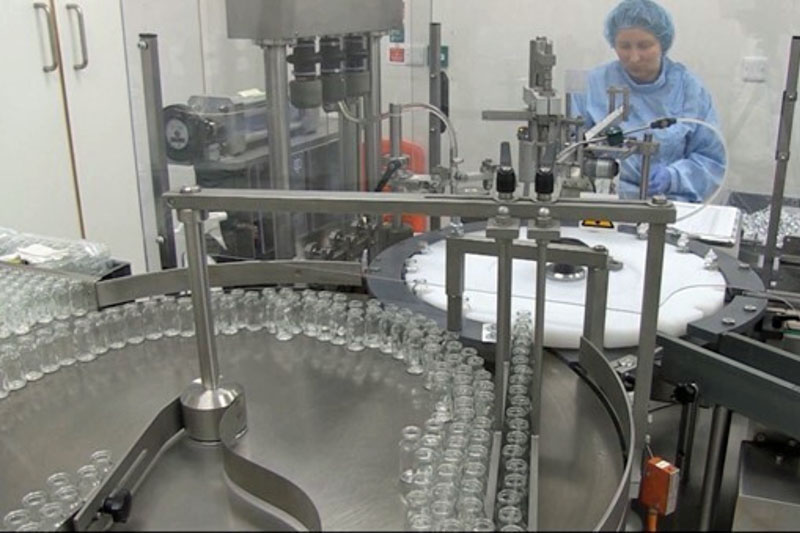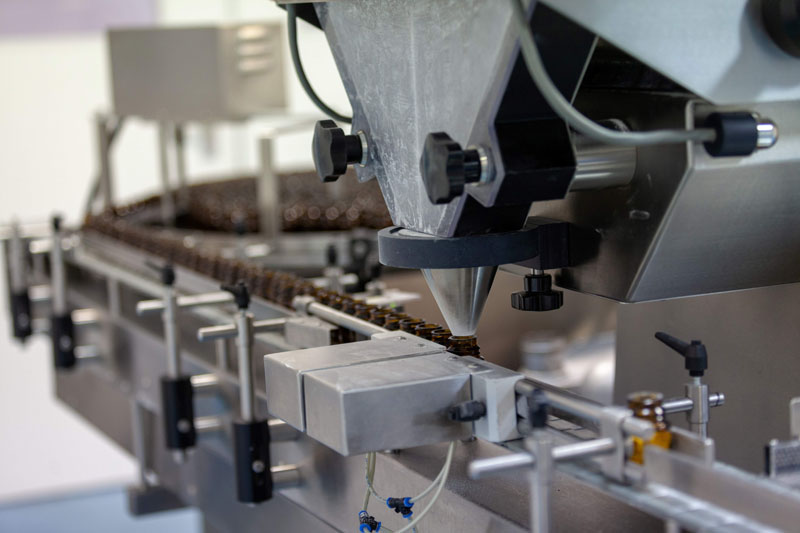Emma Verkaik, CEO of the BCMPA – The Association for Contract Manufacturing, Packing, Fulfilment, and Logistics — highlights the significant role that these partnerships play to ensure the sector’s continued growth and innovation
Recent research from Oxford Economics underscores the resilience of the life sciences sector, which has outperformed many other industries during the past year.
This strength partly derives from the nature of pharmaceutical demand, which remains strong even during economic downturns as consumers prioritise health and well-being regardless of financial pressures.
The report further indicates promising long-term growth prospects for the sector, fuelled by increased purchasing power in developing economies, ageing populations and a heightened focus on health in first-world countries.
Meanwhile, an article titled “Emerging Trends in Life Sciences Markets: The UK as an Innovation Hub” identifies the UK as a highly attractive market for life sciences innovation, reinforcing the sector’s global significance.1
The strategic role of third-party support
Against this backdrop, third-party outsourcing companies have become indispensable partners for pharmaceutical firms.
From early stage product development and manufacturing to the intricate details of pack design and distribution, the agility and expertise of contract manufacturers and packers are crucial when it comes to helping companies to seize opportunities and stay competitive.
The rise of virtual companies and the increasing trend towards outsourcing have significantly boosted the contract development and manufacturing organisation (CDMO) industry.
Gareth Lewis, Managing Director of PharmaPac, confirms that the sector is experiencing sustained growth as more products are either outsourced or launched by virtual companies.
This shift reflects the growing reliance on specialised outsourcing partners to deliver innovative solutions and bring products to market efficiently.
Packaging development and investment: meeting diverse needs
Outsourcing companies are at the forefront of packaging development, continually investing significant amounts of money in the latest technologies and materials to offer their clients the most effective solutions.
BCMPA members such as Central Pharma, Chester Medical, Flexible Medical Packaging and PharmaPac are leading the way by responding to the evolving demands of the market.
For instance, many of these companies report significant growth in blister packaging, products that require refrigerated packing/storage and stickpacks that offer a convenient and transportable solution for powdered medicines.
At the same time, more traditional packaging formats, including sachets and tubes, remain popular, particularly for products such as lotions and ointments for topical application.
Flexible Medical Packaging notes that these formats continue to be in high demand, reflecting the diverse characteristics of pharmaceutical products and the need for tailored packaging solutions.

To meet these varying requirements, outsourcing companies are making significant investments in new equipment and technologies.
For example, Chester Medical has introduced a new production line that’s specifically designed to handle stickpacks while also increasing shifts across its five blister packing lines to meet rising demand.
Flexible Medical Packaging has recently expanded its blending facilities, enhancing its ability to offer customised solutions for a wide range of products.
Central Pharma, by contrast, is further enhancing its quality assurance processes by integrating AI-powered camera inspection systems to ensure the highest standards of product safety and consistency.
PharmaPac has also made some of its most substantial investments in new equipment during the past 3 years. These investments underscore the company’s commitment to staying at the cutting-edge of packaging technology and delivering the highest quality products to its clients.
By continually upgrading their capabilities, contract manufacturers and packers ensure they can meet the specific needs of their clients, whether it involves developing a new product or scaling-up production to meet increased demand.
Tailored solutions for a sophisticated market
As pharmaceutical products become more sophisticated, the demand for customised packaging has grown. The ability to offer bespoke formats is increasingly important as companies seek to differentiate their products and meet specific regulatory or consumer requirements.
Ian Robinson, Group Business Development Director at Central Pharma, notes a significant rise in demand for tailored packaging solutions; the business is investing heavily in new equipment to satisfy the need for bespoke designs for individual clients.
PharmaPac recently developed a new production line for a customer requiring transdermal patches to be placed in cartons and serialised in a single operation.
The project involved close collaboration with three different machinery suppliers to devise a customised solution that could rapidly count, verify, package and serialise the patches in one seamless process.

Such a tailored approach demonstrates the critical role that contract manufacturers and packers play in helping pharmaceutical companies to bring innovative products to market.
Similarly, Chester Medical has adapted its leaflet in carton technology to meet the specific needs of a new customer. By modifying existing processes and technologies, outsourcing companies can provide their clients with the precise solutions they need to succeed in a highly competitive market.
And investment is not just about equipment. Recruiting experienced and skilled individuals in areas such as quality and engineering has been challenging in the last few years.
Businesses are having to overcome this by focusing on developing team skills. PharmaPac, for example, has undertaken in-house apprenticeships while also providing personal development programmes for colleagues through external courses and qualifications.
Regulatory compliance: navigating a complex landscape
In the pharmaceutical industry, regulatory compliance is paramount. The landscape has become increasingly complex in recent years, particularly with the implications of Brexit.
Outsourcing companies must stay up to date with the latest regulations to ensure that their clients’ products meet all necessary requirements.
Since the beginning of 2024, pharmaceutical companies have needed regulatory approval from the UK’s Medicines and Healthcare products Regulatory Agency (MHRA) to sell medicines and medical products in the UK.
Additionally, separate approval is required from the European Medicines Agency for products exported to the EU. This dual regulatory requirement has added a layer of complexity to the industry; but, outsourcing companies have risen to the challenge to ensure that their clients can continue to operate smoothly in both markets.
Adding to the regulatory landscape is the Windsor Framework, which was introduced last year. Under this agreement, medicines sent to Northern Ireland must now include the wording “UK ONLY” on their packs.
Although UK manufacturers are no longer required to include serialisation on packs post-Brexit, many have chosen to retain this feature as part of their commitment to product security. Other techniques that remain in demand include microtext print, coin reaction inks, data matrix codes and tamper-evident labels.
Tammy Williams, Sales Director at Chester Medical, explains that the different requirements for packs destined for different countries add another level of complexity to pack design and coding.
However, this is when the in-house design and artwork services offered by outsourcing companies prove invaluable.
These services ensure that packs are created to precisely meet individual requirements and comply with MHRA and NPSA guidelines, saving valuable time and providing clients with the peace of mind that their products are fully compliant with all relevant regulations.

The evolving regulatory environment also includes new sustainability standards, such as the EU Regulation on Deforestation-free Products (EUDR).
This guideline aims to ensure deforestation-free supply chains by requiring that pulp and paper-based items prove that they do not originate from recently deforested land or contribute to forest degradation.
Williams cites this regulation as another example of the ever-changing landscape that outsourcing companies must navigate, demonstrating how they can help clients to meet these new standards.
Sustainability in all areas: a collaborative approach
Sustainability has become a critical consideration for both consumers and regulators, and outsourcing companies are responding by integrating sustainable practices throughout all areas of their operations.
The challenge, however, lies in ensuring that environmentally friendly alternatives deliver the same levels of performance and protection as traditional materials.
Ben Cameron, Commercial Project Lead at Flexible Medical Packaging, notes that although there is strong demand for more solutions in sustainable packaging, such as for sachets and tubes, the challenge is to ensure that a product’s efficacy is not compromised by these new packs.
Sourcing the right materials can also be difficult. One example cited by Flexible Medical Packaging is a proposed subscription refill service for alcohol sprays, which involves an outer bottle and a refillable interior bag.
Although this approach helps to reduce plastic usage, finding a suitable bag that can be efficiently and effectively filled, sterilised and returned has proven to be challenging.
In addition to exploring new sustainable materials, outsourcing companies are also focusing on introducing more ecological practices throughout their own operations.
Chester Medical, for example, has implemented a range of initiatives, including zero waste to landfill, LED and motion sensor lighting and the use of up to 60% recycled content in all consumable plastics.
The business has also embarked on its carbon footprint monitoring journey and is on track to deliver a 5% year-on-year carbon reduction from 2023–2028 across Scopes 1, 2 and 3.
Central Pharma has rolled out extensive energy saving programmes throughout its production sites and is investigating greener post-production packaging waste processing methods.
The quest for more sustainable packaging formats is very much a collaborative process, with outsourcing companies working closely with their clients to identify and trial new materials and technologies.
This partnership approach is essential to deliver successful outcomes in the increasingly complex and regulated pharmaceutical market.
“Close working relationships deliver enhanced planning and greater supply chain integration between ourselves and our clients,” confirms Ian Robinson.
By working together, outsourcing companies and their clients can navigate the challenges of the market and develop innovative solutions that meet both regulatory and consumer demands.
Tammy Williams agrees: “Our packaging and engineering knowledge allows us to advise clients about the best approach to a project. We often visit customer sites to better understand their requirements and, in doing so, deliver added value. With the advent of virtual meetings, it is now much easier to keep in regular contact, which helps projects to run even more smoothly.”
Successful partnerships: a bright future for the UK market
The adaptability and resilience of pharmaceutical contract packers and manufacturers have been key to their success in recent years.
Despite the challenges posed by Brexit and other market disruptions, these companies have proven themselves to be capable of weathering such storms and helping their clients to bring products to market successfully.
As companies increasingly look to onshore their operations and bring primary and secondary manufacturing back to the UK, the role of contract manufacturers and packers will only become more significant.
These outsourcing partners are well-positioned to support the UK’s pharmaceutical industry by navigating the complexities of the market and seizing new opportunities.
With their knowledge, adaptability and commitment to innovation, these companies will undoubtedly continue to play a crucial role in the sector’s success for years to come.
Reference
- www.carnallfarrar.com/emerging-trends-in-life-sciences-markets-the-uk-as-an-innovation-hub/#.
With thanks to Chester Medical, PharmaPac, Central Pharma and Flexible Medical Packaging

